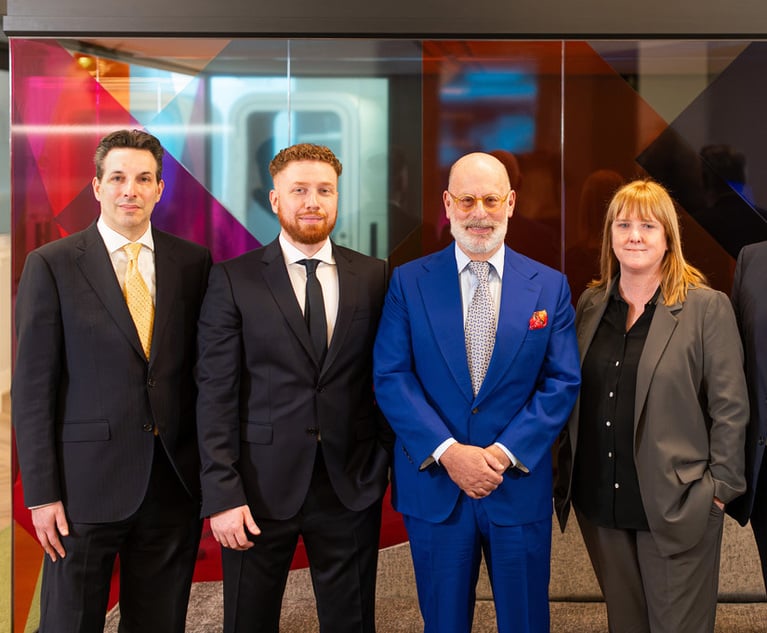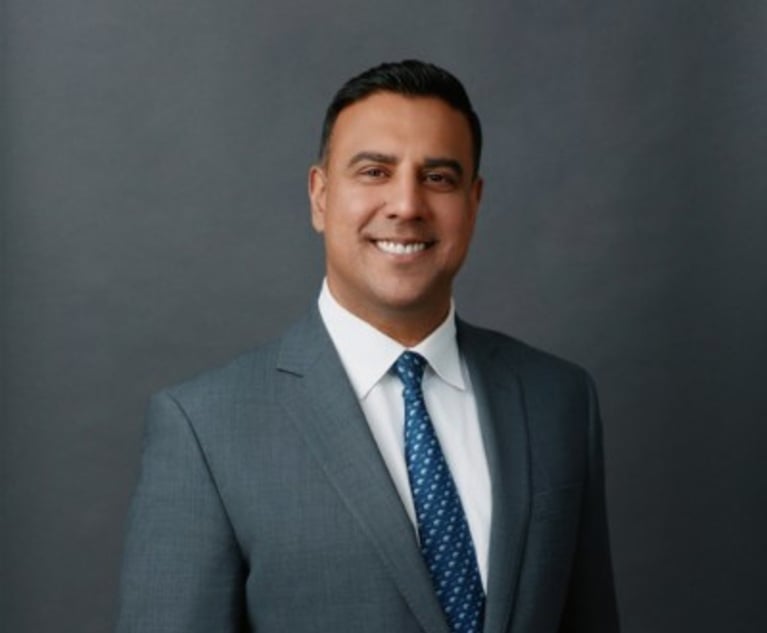Exits continue from Linklaters alliance partner Webber Wentzel as it loses two further practice heads
Senior exits continue from Webber Wentzel as former partners question the impact of the Linklaters alliance
September 21, 2015 at 07:28 AM
6 minute read
Three more senior lawyers have left Webber Wentzel as former partners claim the South African firm's alliance with Linklaters is causing dissatisfaction among some parts of the partnership.
Brigette Baillie the head of Webber Wentzel's energy and infrastructure group resigned from the partnership last week.
Mark Linington, the firm's private equity sector head, and Dries Hoek, director in the firm's tax practice are also set to leave Webber to join former DLA Piper alliance firm Cliffe Dekker Hofmeyer. These moves comes shortly after news that private equity co-head John Bellew and M&A partner James Westgate have left the firm to join Bowman Gilfillan on 1 October.
Former partners claim that the issue of how pan-African work is handled is a source of frustration for some in Webber's partnership. A former Webber partner said: "It is clear that Linklaters wants to drive the Africa process."
As part of the alliance agreement between the two firms struck in 2012, Webber is understood to need to check with Linklaters before it takes on any African mandates outside South Africa, enters into associations or opens any new offices. There is also a requirement that Webber will try and involve Linklaters as much as possible on any Africa-related instructions.
A former Linklaters partner said: "The relationship with Linklaters brings [Webber] a real opportunity, but where it chafes for them is that they had an aspiration to be a pan-African firm and doing premium work in Africa. The problem is the premium work that they want in Africa conflicts with the premium work that Linklaters wants in Africa."
As part of the alliance Webber has stopped offering English law advice, with Linklaters picking up the English law elements. According to one ex-Webber partner this has also been "one of the drivers behind people leaving."
English qualified lawyers to have left the firm since the alliance include partner Roddy McKean who joined Anjarwalla & Khanna in September 2013, senior associate Christopher Jackson who joined Black Rhino Group as general counsel in January of this year, partner Jason van der Poel who joined Allen & Overy in April this year and partner Sarah Adcock who left the firm earlier this year.
Both Webber and Linklaters deny that there are any issues between the two firms in relation to work in Africa. Webber managing partner Sally Hutton said: "We have a very close relationship, it's a flexible one which is designed to enhance our offering to clients in Africa and to put the best team forward."
Andrew Jones, head of Linklaters' Africa practice, said of the relationship between the two firms: "It might seem strange as we are two separate firms but if you see us as brother and sister and so extremely close, it's no different to what any law firm would do between offices."
Closer integration
Sources cite changes in approach at Webber since its alliance with Linklaters as a factor behind the raft of exits from Webber's partnership in recent months, pointing to collaboration between Webber and Linklaters on questions such as management, corporate culture and targets as issues for some partners.
An ex-Webber partner said of the changes, "like any firm, some partners like it, some partners don't and the partners that don't like it are moving."
And added: "Linklaters is much more influential inside Webber's management then you would expect from an association."
Jones counters: "There have been lots of secondments and other collaboration between lawyers and between the wider business support side of things, whether that is in marketing, human resources, business development, finance or IT, and a lot that goes both ways."
The increased integration is seen by some as a possible precursor to a full merger further down the line. An ex-Webber partner said: "People at Webber Wentzel admit that it's probably the plan to bring Webber into Linklaters."
Another said: "[A merger] is not inconceivable, in fact it is very conceivable." Adding: "There are definitely aspirations within certain pockets of the [Webber] partnership who would want that model to work."
Jones said: "I think everybody is just focused on making the alliance work and we review it very regularly, nobody is closed to the idea [of a merger] but the real focus is making the alliance work."
One Linklaters partner agreed that there was a shared aspiration within the two firms to move closer together, but thought a possible merger was unlikely for structural reasons. Webber has approximately 150 partners and over 400 lawyers, which would make it difficult for Linklaters to swallow in any potential merger, without significantly diluting profits.
However, an ex-Webber partner argued that "Webber Wentzel wants to become leaner – I don't think they have a problem with partners leaving."
A Linklaters partner noted that both before and after Linklaters' past European mergers, those merger targets trimmed their partnerships.
Webber denied that it was shrinking its partnership, saying that it had grown from 116 partners five years ago to 150 partners this year (after the recent departures), with 22 lateral hires in the last 18 months, 73% of which are equity partner hires.
Management changes
Webber Wentzel experienced a management change in March this year after long-time leader David Lancaster retired. The role was split, with Sally Hutton taking over as managing partner and Christo Els as senior partner.
Hutton said of Baillie's exit: "We have agreed with Brigette that we part ways at this point, she has been at the firm for a long time and we wish her well. With any change in leadership comes other change, one of the things that is driving it is a deepening of our commitment to our firms values and culture, it's natural that with a change in leadership there is some recalibration."
Hutton was quick to dismiss speculation concerning recent exits from the firm, putting them down to personal factors, performance issues or issues around culture and values.
She added that a merger "is not on our radar. Our greater priority is to work more closely together to drive the collaboration and integration. It's about making the most of the alliance and increasing the relationship between our firms."
This content has been archived. It is available through our partners, LexisNexis® and Bloomberg Law.
To view this content, please continue to their sites.
Not a Lexis Subscriber?
Subscribe Now
Not a Bloomberg Law Subscriber?
Subscribe Now
NOT FOR REPRINT
© 2025 ALM Global, LLC, All Rights Reserved. Request academic re-use from www.copyright.com. All other uses, submit a request to [email protected]. For more information visit Asset & Logo Licensing.
You Might Like
View All
Rosenblatt Breaks Away From RBG, Becomes 40-Strong Standalone Firm

Eversheds Sutherland Outgoing Co-CEO to Move to Dubai to Spur Regional Growth
2 minute read
More than Half of South Australian Lawyers Report Suffering Harassment
3 minute readTrending Stories
- 1Uber Files RICO Suit Against Plaintiff-Side Firms Alleging Fraudulent Injury Claims
- 2The Law Firm Disrupted: Scrutinizing the Elephant More Than the Mouse
- 3Inherent Diminished Value Damages Unavailable to 3rd-Party Claimants, Court Says
- 4Pa. Defense Firm Sued by Client Over Ex-Eagles Player's $43.5M Med Mal Win
- 5Losses Mount at Morris Manning, but Departing Ex-Chair Stays Bullish About His Old Firm's Future
Who Got The Work
J. Brugh Lower of Gibbons has entered an appearance for industrial equipment supplier Devco Corporation in a pending trademark infringement lawsuit. The suit, accusing the defendant of selling knock-off Graco products, was filed Dec. 18 in New Jersey District Court by Rivkin Radler on behalf of Graco Inc. and Graco Minnesota. The case, assigned to U.S. District Judge Zahid N. Quraishi, is 3:24-cv-11294, Graco Inc. et al v. Devco Corporation.
Who Got The Work
Rebecca Maller-Stein and Kent A. Yalowitz of Arnold & Porter Kaye Scholer have entered their appearances for Hanaco Venture Capital and its executives, Lior Prosor and David Frankel, in a pending securities lawsuit. The action, filed on Dec. 24 in New York Southern District Court by Zell, Aron & Co. on behalf of Goldeneye Advisors, accuses the defendants of negligently and fraudulently managing the plaintiff's $1 million investment. The case, assigned to U.S. District Judge Vernon S. Broderick, is 1:24-cv-09918, Goldeneye Advisors, LLC v. Hanaco Venture Capital, Ltd. et al.
Who Got The Work
Attorneys from A&O Shearman has stepped in as defense counsel for Toronto-Dominion Bank and other defendants in a pending securities class action. The suit, filed Dec. 11 in New York Southern District Court by Bleichmar Fonti & Auld, accuses the defendants of concealing the bank's 'pervasive' deficiencies in regards to its compliance with the Bank Secrecy Act and the quality of its anti-money laundering controls. The case, assigned to U.S. District Judge Arun Subramanian, is 1:24-cv-09445, Gonzalez v. The Toronto-Dominion Bank et al.
Who Got The Work
Crown Castle International, a Pennsylvania company providing shared communications infrastructure, has turned to Luke D. Wolf of Gordon Rees Scully Mansukhani to fend off a pending breach-of-contract lawsuit. The court action, filed Nov. 25 in Michigan Eastern District Court by Hooper Hathaway PC on behalf of The Town Residences LLC, accuses Crown Castle of failing to transfer approximately $30,000 in utility payments from T-Mobile in breach of a roof-top lease and assignment agreement. The case, assigned to U.S. District Judge Susan K. Declercq, is 2:24-cv-13131, The Town Residences LLC v. T-Mobile US, Inc. et al.
Who Got The Work
Wilfred P. Coronato and Daniel M. Schwartz of McCarter & English have stepped in as defense counsel to Electrolux Home Products Inc. in a pending product liability lawsuit. The court action, filed Nov. 26 in New York Eastern District Court by Poulos Lopiccolo PC and Nagel Rice LLP on behalf of David Stern, alleges that the defendant's refrigerators’ drawers and shelving repeatedly break and fall apart within months after purchase. The case, assigned to U.S. District Judge Joan M. Azrack, is 2:24-cv-08204, Stern v. Electrolux Home Products, Inc.
Featured Firms
Law Offices of Gary Martin Hays & Associates, P.C.
(470) 294-1674
Law Offices of Mark E. Salomone
(857) 444-6468
Smith & Hassler
(713) 739-1250









